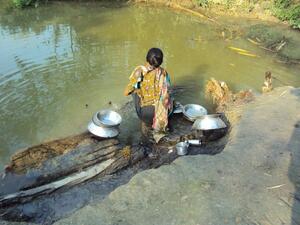Bangladesh
Bangladesh is a fast growing developing country which is going to be become middle income country soon. Despite being a riverine country, safe drinking water is becoming scarce because of the water pollution, salinity and widespread arsenic contamination. Still 14% of the households do not have access to safe water and 46% do not have access to improved sanitation facilities. Open defecation has been reduced from 42% in 2003 to 6% in 2009. Based on Household Income and Expenditure Survey, this figure has now dropped to 4.4% in 2010. Salinity and arsenic contamination in the surface and groundwater is spread over the whole country and especially in the northern and southern parts of the country figures are alarming. These households are marginalized in terms of safe water access compared to other parts of the nation. Besides, maintaining hygiene is not well practiced in Bangladesh.
Study on WATSAN-Agriculture Hygiene Education
Knowledge and practices about contamination along the path from the drinking water source to use/consumption both in households and agricultural fields are crucial to improve the health and developmental outcomes of farm households. Are there any linkages between water, sanitation and hygiene (WASH) with agriculture in different agricultural systems in rural areas? How can the capacity of households and communities in monitoring their own water and sanitation (WASH) environment be developed? How can WASH behavior be improved? We start from the assumption that information can increase demand for environmental quality, improve WASH behavior, and thus improve health outcomes at the household level. We test the effectiveness of the packages of WASH interventions with the secondary school students network (student brigades) impacting the WATSAN behavior of adult household members both at the households and in the farm fields and health outcomes for the household members. To that effect, we devise Randomized Control Trial (RCT) with student brigades in 6 WATSAN hotspots (sub-districts) of Bangladesh, conducted in several phases. Following a water quality census, a sample of 648 fecal-contaminated households is drawn and the baseline survey is conducted. The treatments consists of three actions : informing the households about the initial water testing results obtained from the earlier census, deliver hygiene messages through a poster related with farm field and households use, and equip the student brigades with water testing toolkits and let them test water at different points and communicate the results back to their households. Finally, the end-line survey is planned.
Partners: BRAC Research and Evaluation Division (RED)
Contact person: Dr. Mohammad Abdul Malek
Study on Food Hygiene Education
Evidence and the observational studies show that improved hand-washing and safe stool disposal benefit health outcomes like diarrhea. Although the growing understanding of the drivers of hygiene behavior, some important gaps exist in the literature. It is noted that almost no trial of the effectiveness of intervention to improve food hygiene in the developing countries are available (Curtis et al., 2011; DFID, 2013). Hence the scope for doing Randomize Controlled Trial (RCT) of Food Hygiene Education (FHE) is promising to find out how safe-hygiene practice matters of daily routine in the context of homes, schools and workplace to achieve major gains to household health outcomes. The research makes at least some contributions by identifying the trade-off, synergies and threshold of AG-WATSAN nexus, the role of institutional arrangement such as group based approach for financing including microfinance for this issues, technological arrangement for providing multipurpose water-system from public investment, determinants of health investment behavior and how food hygiene education (FHE) affect health outcome of rural households especially the under five children. The research has conducted randomized controlled trial (RCT) for food hygiene education in two districts of rural Bangladesh. Microbiological test such as E. coli in water and food utensils has been tested for three successive terms to see the impact of Food Hygiene Education (FHE).
Partners: IFPRI Bangladesh
Contact person: Mohammad Monirul Hasan




